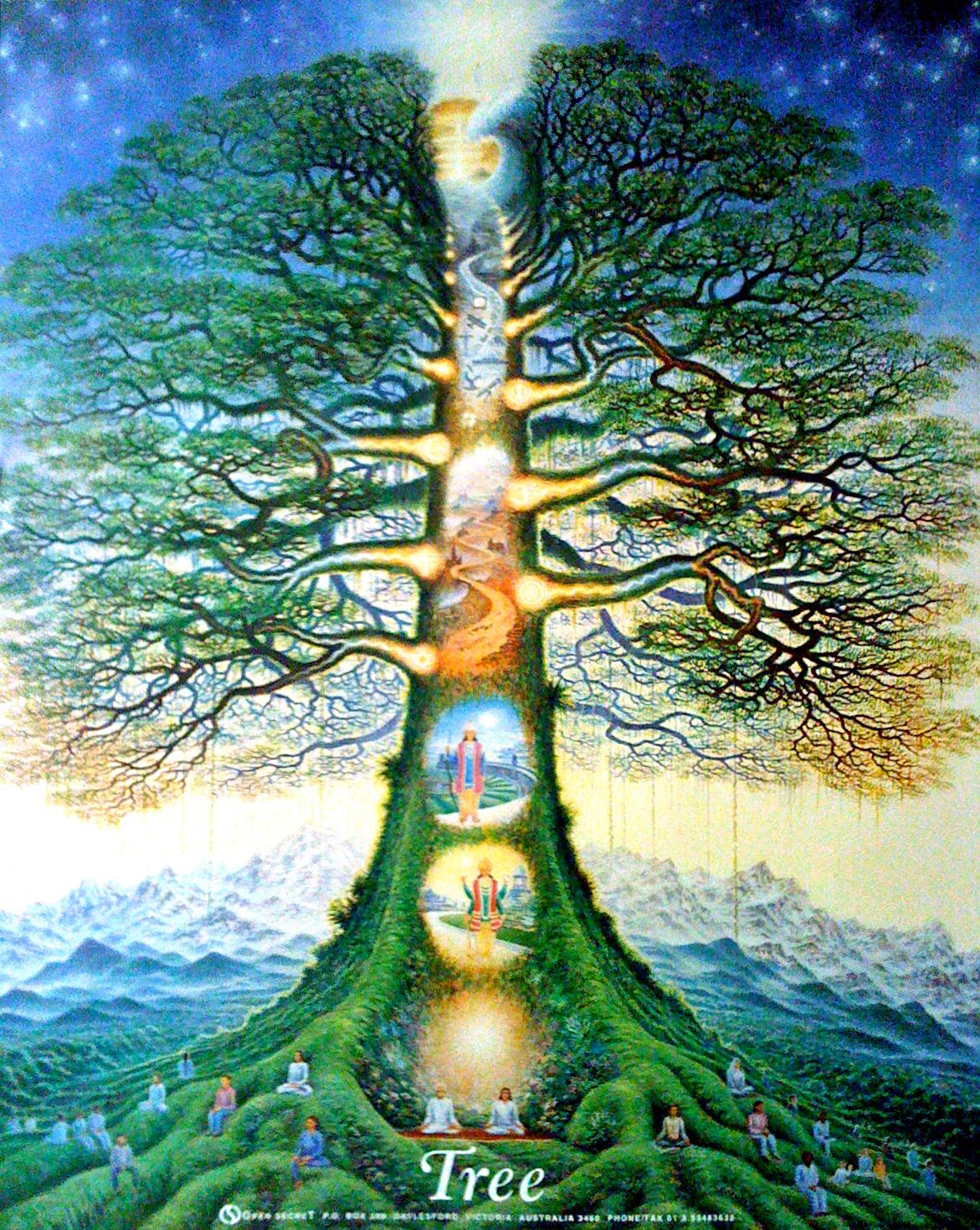
Someone wrote, apologizing for “momentarily falling for the guise of (my being) a human, just like me.” But, why should I not be human? It is the mind only that divides up this world and says, “This is human and this other Divine.” To break the barrier between human and Divine is the greatest task we have before us.
A dualistic perspective tells us, “the human in me is not Divine, and the Divine I sometimes comprehend is not the human.” Our experience tends to bear this out—when you know the human self, you feel that you are only an individual, separate from God. When you are lifted up into God-consciousness it is something so completely different—better, higher, purer—that you cannot think of the human and Divine as being in the same category.
But, can a living branch ever say to the tree, I am not of you? If the branch were to really think on it—its life must come from the trunk, which has its source in the roots; in fact, they are all the same organism. This is to say, every individual soul is rooted in the Divine Essence and can never be separate—or else it would cease to live, it would no longer be.
It is the task of the mind to practice spiritual methods for realizing a fact that is already so. The mind is limited when it looks at the human and sees it as a separate thing. When the aspirant is devotedly focused on God, it is consequently lifted up through bhakti (aspiring for God-vision) and the devotee comes to experience God—sometimes within, sometimes without. The bhakta yearns for God with everything he or she has and strives to realize the object of his love and adoration.
Through the bhakta’s repeatedly touching the fabric of God’s Being, the mind is further purified and now the state of God-experience makes the world seem like a dream. In this uplifted state of the jnana the mind thinks of the world as an illusion that is not God. The jnana says, “Transcendent God alone is real, all else is false.” This high state of the jnana is tremendous, but it too is not our final destination—there is more.
We continue our quest for the universal-vision of God. Being immersed in transcendent God-experience the mind is further purified, lifted into the state of para-bhakti, the supreme state of Purushottama. The para-bhakti perceives the transcendent state manifesting as the world, the body and even as the expression of the ego; all are manifestations of a single, unified life. Now, God is seen operating in the highest consciousness and manifesting itself as all in all. In this supreme Reality everything is known to be God—within, without and everywhere about. Established in this supreme Reality the soul fulfills its highest purpose.
Realized beings exist as living manifestations of these great truths. Saints manifest a bhakta’s great love for God and inspire that same love and dedication in others. Some saints become mystics of a higher order, they see the world as no longer real; it is not evil, it is not good, it is simply an illusion that stands in the way of perceiving transcendent Spirit, a thing of unreality. Then there is the universally realized Soul who knows that all is God, and God is all—that the branch is a flawless manifestation of the tree, just as the wave is a natural creation of the ocean.
The mistake is made when the branch thinks of itself as separate from the tree, or the wave from the ocean. This creates a false dichotomy that, in reality, can never be. Those on the upward path sees the spiritual master and encounters his humanness. The aspirant can project onto the master his own ignorance, seeing the master as a human being only. In truth, the master is working, through his or her humanity, to help universalize the vision of those around him by being both human and Divine. Mataji was disturbed by what she saw in Papa when he showed preference for some over others. She had not yet realized that God was working through Papa in the way he brought some in close, others he kept more at a distance. This did not represent ignorance in Papa—it was not that he did not see God in all—it is simply how God was operating in his form for the highest good of all.
In fact, to be able to function in this world a fully realized master must show distinctions, it is the nature of creation. For a fully realized master, whether one is close or far away, all are God. A master will even orchestrate difficult situations for the disciple, as did Master with Mother when he created an invisible barrier between them that lasted for three years. By doing so he was helping to purify Mother and prepare her for the universal vision. And, as Mother said of Papa, he loved me so much, he was willing to hurt me. This can sound strange, even wrong to one who has not experienced it. But it is true, even as a surgeon, when slicing you open, is working to cure you.
So, let us love and strive as bhaktas, discriminate as jnanas, and follow in the steps of great spiritual masters in attaining the universal-vision–becoming para-bhaktas; free in the ultimate realization when the human and the Divine merge. Then, no matter where we look, what we do, there is only One, only God. “Hear O’ Israel, the Lord is our God. The Lord is one.” (Mark 12:29)